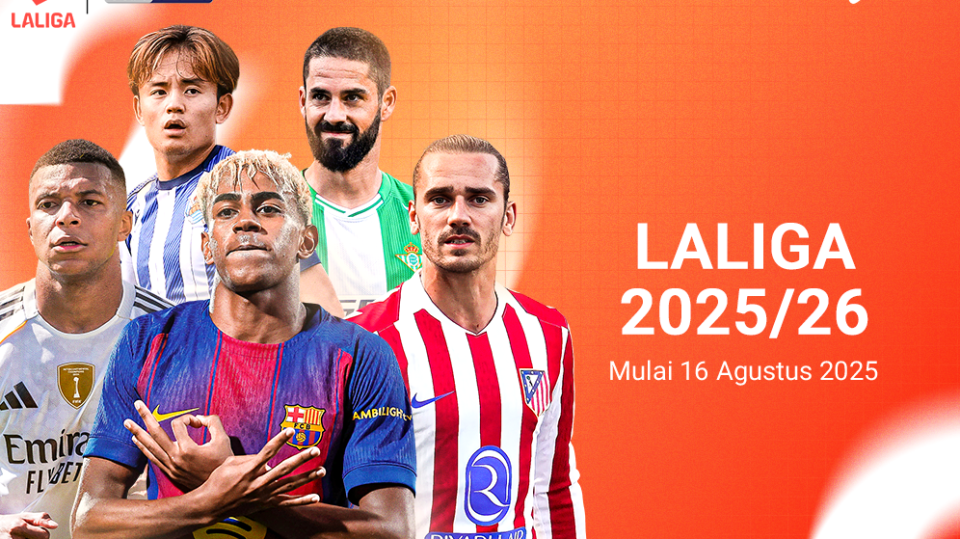The La Liga 25-26 season is poised to be one of the most exciting and fiercely contested campaigns in recent memory. As two of the most illustrious football clubs, Barca and Real Madrid, gear up to clash once again, fans worldwide are already on the edge of their seats. With their rich histories, star-studded squads, and strategic prowess, these giants are determined to dominate the league and establish their dominance early in the season. This article dives deep into the tactical preparations, historical context, psychological factors, and expert predictions for what promises to be a captivating fight for the La Liga crown in the 2025-2026 season.
The La Liga 25-26 promises a spectacle of tactical mastery, individual brilliance, and team resilience, especially as Barca strives to uphold their attacking dominance, while Real balances their classical solidity with swift counterattacks. As the season unfolds, it will be crucial to understand each team’s strategic nuances, their head-to-head history, and how psychological resilience could impact their performance in critical moments. What’s clear is that this year’s title race could be decided by a few key moments, tactical adjustments, or even mental fortitude. The fierce rivalry continues to inspire everlasting passion among fans and players alike, setting the scene for a memorable season.
More Josep Bartomeu Destroyed Barcelona – The Rise and Fall of a Once-Great Club 2025
Tactics and lineup predictions for the match.

In the upcoming matches, the tactical setups are expected to reflect each team’s core philosophy, with Barca leaning heavily on their classic 4-3-3 formation, emphasizing quick, intricate passing and relentless pressing. Their focus would likely be on exploiting the flanks, utilizing the speed and dribbling finesse of their forwards, especially the talented young star Lamine Yamal, who has already proven to be a game-changer. The coaching staff might also incorporate high pressing and rapid transition play to unsettle opponents early on, aiming for early goals and psychological dominance. Given their recent form, Barca will be aiming to impose their style from the outset, with a keen eye on maintaining possession and dictating the tempo of the game.
Real Madrid, on the other hand, is anticipated to adopt a pragmatic counterattacking approach, leveraging their traditional defensive solidity with swift, coordinated offensive transitions. Coach Carlo Ancelotti could deploy a flexible 4-2-3-1 system, optimizing the speed of stars like Vinicius Jr. and Brahim Diaz to break through high defensive lines. The team’s strategy might involve absorbing pressure in the initial phases and then launching quick, incisive counters to capitalize on turnovers. This approach requires disciplined positioning, sharp decision-making, and confidence in their defensive line, especially considering injuries to key players like Jude Bellingham. Both teams’ lineups will also be influenced by current squad fitness, injury status, and tactical adjustments made just before kickoff.
Analysis of past confrontations and current performance.

Historically, Real Madrid holds a significant edge over Barca in their head-to-head encounters, with Madrid winning approximately 55 of their 85 meetings. This dominance is rooted in their often disciplined, pragmatic approach and moments of individual brilliance that have consistently turned the tide in crucial fixtures. Their recent encounter, a 2-0 victory on Oviedo’s turf, underscores Madrid’s ability to perform under pressure and their capacity to capitalize on defensive lapses. While Barca has been dominant in terms of offensive firepower and possession statistics, their success often hinges on breaking down disciplined defenses, which Real is well-equipped to provide.
As for current momentum, Real Madrid kicked off the season impressively, securing a 1-0 victory against Osasuna, with a decisive goal from Mbappe via a penalty, highlighting their offensive potency and tactical discipline. Meanwhile, Barca also demonstrated their attacking prowess with a commanding 3-0 win over Mallorca, reaffirming their status as title contenders. However, Barca’s squad is still adjusting to new signings and integrating younger talents, which might result in some inconsistencies early on. The vital aspect will be which team can sustain their form, adapt quickly to opposition tactics, and avoid slipping into complacency during the crucial early fixtures.
Assess the strategic and psychological factors in competition.
Tactical factors and mental resilience will undoubtedly play pivotal roles in La Liga 25-26. Barca’s attacking style relies heavily on the continuous creation of scoring opportunities, demanding high levels of coordination and confidence from their players. Their recent matches suggest a team that is keen to impose relentless pressure, but they must be cautious of overextending, which could open gaps for counterattacks. The psychological aspect of maintaining a winning mentality early in the season can give Barca a significant edge, especially if they secure dominating victories against lower-ranked teams.
Similarly, Real Madrid will strive to maintain their composure and tactical discipline, especially in away fixtures where they often face intense pressure. Their seasoned squad, with experienced players and a solid defensive foundation, is well-equipped to handle tense situations. However, the mental challenge of competing against a highly motivated Barca requires resilience, strategic patience, and the ability to adapt swiftly to match conditions. Both teams are under pressure to deliver immediate results, and their psychological strength will likely influence game outcomes during critical moments such as set pieces, VAR decisions, or late-game scenarios.
Predictions and strategies anticipated for the La Liga 25-26 season.
As La Liga 25-26 kicks off, predictions suggest that Barca will continue their offensive dominance, with an emphasis on quick passing, positional rotations, and high-intensity pressing. Their goal is to establish a points lead early and leverage their offensive depth, especially with rising stars like Yamal leading the charge. Expect them to favor aggressive attacking formations and look to create multiple goal-scoring opportunities, with their defense remaining organized to prevent counterattacks. Their early fixtures are likely to set the tone for their title challenge, and if they maintain consistency, a comfortable points lead could be in the cards.
Real Madrid are anticipated to adopt a more balanced approach, focusing on tactical discipline, set-piece efficiency, and swift counterattacks to secure critical points early in the season. Ancelotti will likely emphasize flexibility—switching between defensive solidity and offensive bursts based on the flow of the game. Their key to success will be exploiting opponents’ lapses and maintaining composure under pressure. Predicted to aim for tight wins rather than vague goal margins, Real may prefer an adaptable strategy to contain Barca’s relentless press and capitalize on their own countering speed. Both teams’ tactical nuances and matchday adjustments will be thoroughly scrutinized as the season progresses.
Analysis of the potential of the major football teams.
The big clubs’ potential hinges on several factors—player quality, tactical execution, and the ability to respond to adversity. Barca’s squad boasts impressive young talents like Yamal, seasoned internationals, and a cohesive attacking unit that, if firing on all cylinders, could decimate defenses. Their style of possession-based football puts pressure on opponents from the first whistle, giving them a significant advantage if they maintain their high-energy approach. Nevertheless, their defensive organization and reliance on youthful exuberance could pose challenges against more experienced sides like Real.
Real Madrid offers a blend of experience, tactical flexibility, and star power, especially with world-class players such as Mbappe and Vinicius Jr. Their ability to switch seamlessly between defensive blocks and rapid counters makes them formidable, especially in high-stakes fixtures. The key concern remains injuries—Jude Bellingham’s absence has tested their midfield strength—and the need for collective resilience. Their squad depth and tactical acumen have proved time and again that, under the right circumstances, Real can challenge for the title and even claim dominance if their key players perform at their peak throughout the season.
Tactics and preparation plans of major teams.
Both Barca and Real are investing heavily in preparing tactical systems and squad depth for this campaign. Barca’s coaching staff appears committed to enhancing their possession game and exploiting spaces with quick, short passes, as seen in their recent dominant victory over Mallorca. Training regimes are geared towards improving transition attacks and defensive solidity, especially as they integrate new signings into their tactical plans. Their primary focus remains on maintaining high pressing and exploiting offensive set pieces, which can often turn matches in their favor.
Meanwhile, Real Madrid has continued to develop their counterattacking philosophy, sharpening the link between defense and offense through rigorous tactical drills. Ancelotti’s team is preparing for adaptive formations, depending on opponents’ strengths and weaknesses, with an emphasis on quick, coordinated build-ups from the back. They are also working on mental resilience and situational adaptability, which are crucial for handling tight matches in a competitive league like La Liga. Both clubs understand that consistent tactical innovation and squad management are vital for moving beyond the strengths of their rivals during this season.
Assessment prior to major matches and prediction of outcomes.
Big matches early in the season will be telling of each team’s true potential. Based on current form and tactical readiness, Barca looks slightly ahead, with their attacking prowess and recent results giving them a psychological edge. Predictions lean toward Barca securing victories with margins of 2-3 goals over less defensively disciplined teams early on, which can set an optimistic tone for their title chase. However, matches against top-tier opponents like Real will be the real test of their resilience and tactical discipline.
On the other hand, Real Madrid, under their veteran coach and with a tactically flexible squad, might prioritize tactical discipline and strategic counterattacks to secure narrow victories or even salvage draws in difficult fixtures. Their experience and calm approach could prove pivotal in tight games, and if they manage to avoid key injuries, they are well-positioned to challenge Barca all season long. The outcome of these high-profile clashes will greatly influence the league standings and set the stage for a dramatic race to the finish line in the La Liga 25-26.
Summary
The La Liga 25-26 season promises to deliver relentless excitement, tactical innovation, and fierce rivalry, especially as Barca and Real Madrid take center stage. With their distinct styles—Barca’s attack-oriented philosophy and Real‘s counterattacking solidity—they embody the different philosophies that make La Liga so enthralling. Early fixtures will be crucial in setting the tone for the season, with both teams aiming to showcase their supremacy through strategic plays and mental toughness. The ongoing battle will be marked by tactical adjustments, squad management, and the mental resilience of players under pressure. Ultimately, fans can look forward to a season full of unpredictable turns, breathtaking goals, and relentless pursuit of glory from the giants of Spanish football. La Liga 25-26 has all the ingredients to be a historic chapter in the storied rivalry between Barca and Real, making it a must-watch for every football enthusiast.

